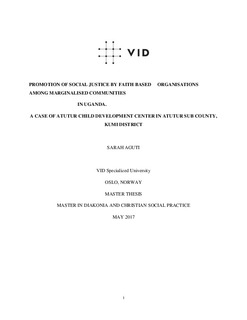| dc.description.abstract | Issues of social justice still face numerous challenges across Sub Saharan Africa. The reasons why these challenges are still being faced is because culture still bounds people, some groups of people like the women, children, the disabled among others are still considered less important in society when it comes to issues of rights. These groups of people have been limited to access a wide range of rights like for women a right to property ownership, education, forced marriages in some culture is still prominent. This has left these groups of people vulnerable, discriminated and marginalized within their communities. It is for this reason that this study purposed to explore “How the FBO is promoting social justice in Atutur sub county, Kumi district in Uganda”
The study was guided by two theories, the theory of social inclusion and exclusion and the social dominance theory. The study chose qualitative research approach with a case study design. The data were collected by the means of semi structured interviews and document analysis which targeted the Community development officers and Community leaders. The respondents of the study were chosen purposively and the study interviewed twelve participants.
Through the use of qualitative case study design, data from individuals were analyzed based on the thematic data analysis to establish the findings. After data analysis and interpretation, themes were generated through the process of coding and transcribing of the data. Five themes emerged, which were used to answer the main research question. The findings highlighted notable issues, during the discussion of the findings relevant examples were drawn from the theoretical framework while more examples were also cited from the theories and directly linked to the findings. These examples included deprivation from education, health, denial of justice, dignity and respect among others. After the discussion and analysis of the data it was noted that indeed the FBO promoted social justice and thus some strengths and weaknesses were also noted and there was no cause to regret since social justice is a very difficult concept to achieve.
The recommendations were drawn and these included the role of leadership, building the capacity of all people, encouraging further sensitization, increasing the funding for social justice activities, addressing gender inequality and further research in the field of social justice. Finally a conclusion was drawn and the general analysis suggested that although the FBO faces some challenges as regards its funding, it has done its best in promoting social justice. | nb_NO |
